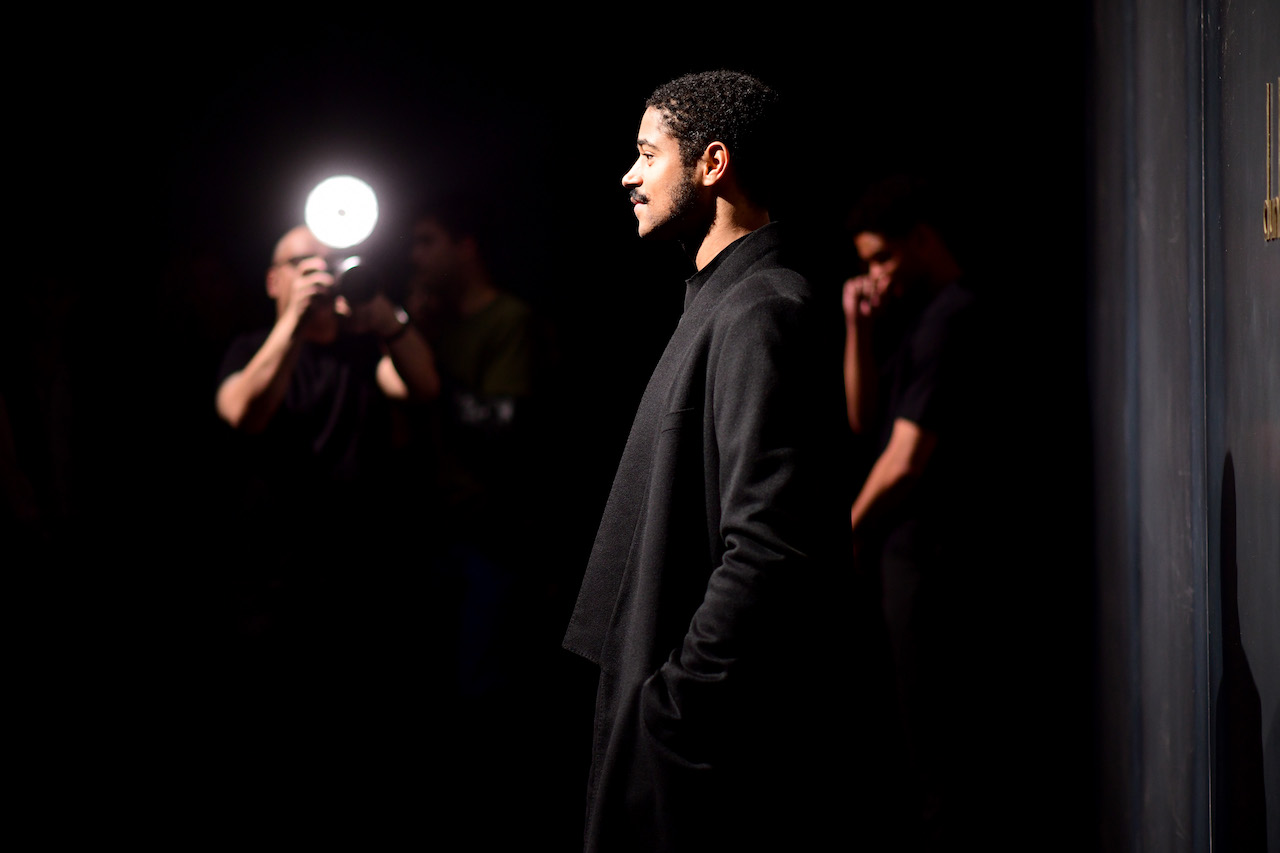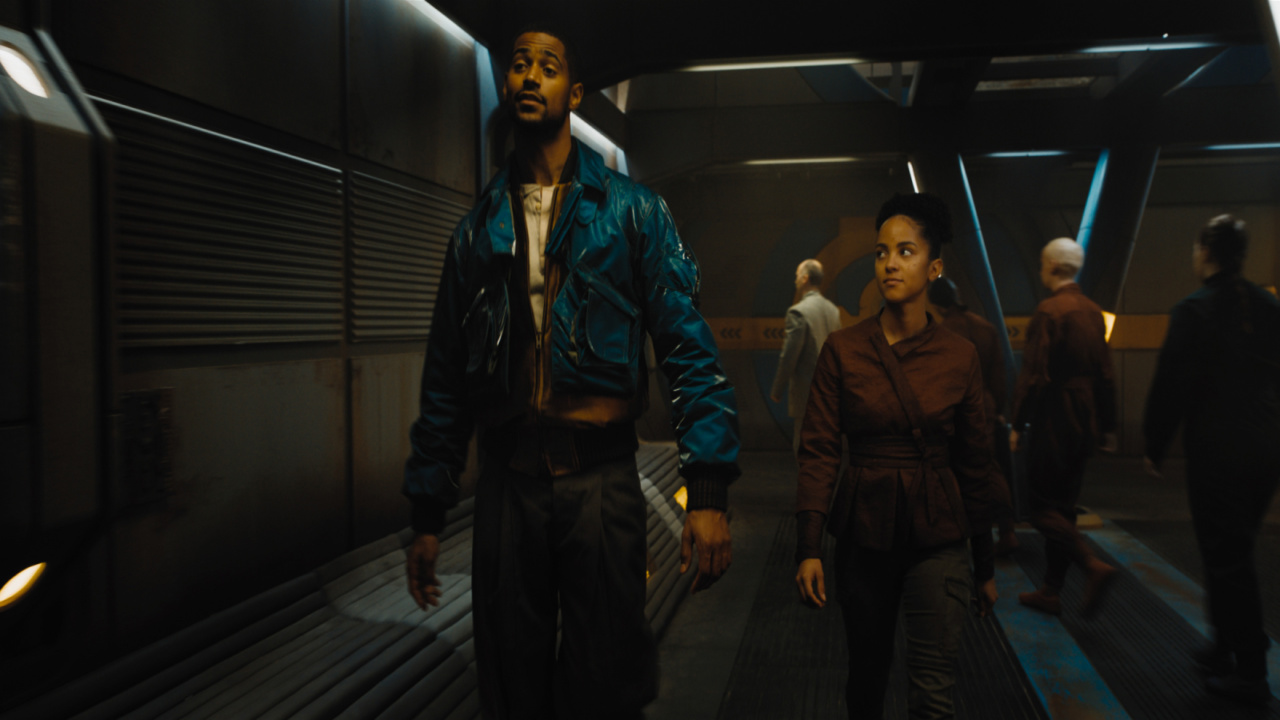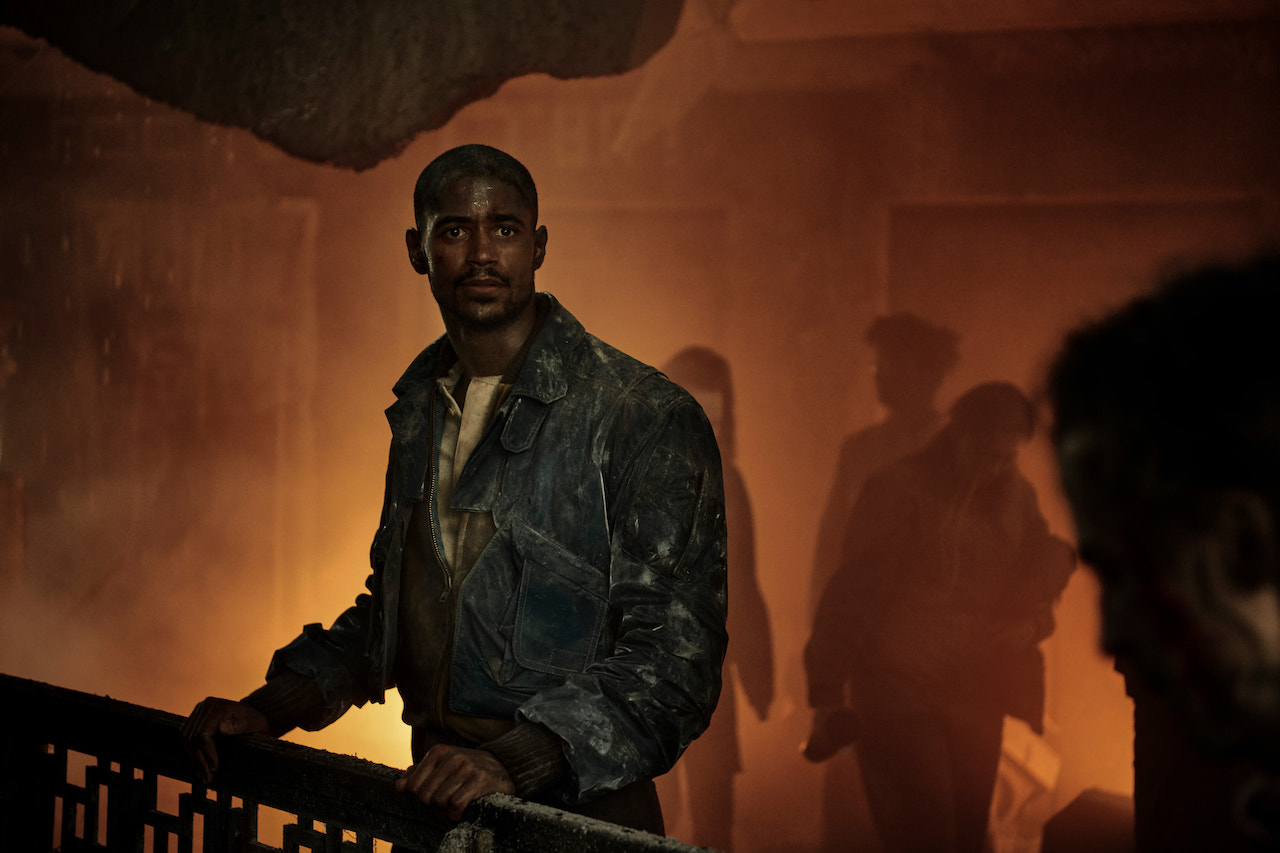

Alfred Enoch, the young star of Apple TV+’s sci-fi hit Foundation, is known as “Alfie” over here in London. There is, like Michael Caine, who starred in Alfie, a kind of delectation the guy exudes at his good luck of living the life of an actor. He cuts the dashing figure of a young Sidney Poitier. His beauty—there is no other word for it—even reminds me of Merle Oberon. He’d make a great Oberon, in fact, in Shakespeare’s A Midsummer Night’s Dream.
I first noticed Enoch in his role of Wes Gibbins in the ABC series How to Get Away with Murder. But I was really impressed when I saw him on the West End in Red as he held the stage with Alfred Molina in this two-hander by Josh Logan about the artist Mark Rothko in which Enoch played Rothko’s studio assistant, Ken, an artist in his own right. He also played Aeneas in the BBC/Netflix coproduced series Troy: Fall of a City and you can now watch him portray Raych Seldon in the Apple TV+ series Foundation. Oh, and remember him as Dean Thomas in the Harry Potter series of films?

I met Enoch after a matinee of Romeo and Juliet at Shakespeare’s Globe theatre here in London where he was appearing as Romeo earlier in the fall. You can see his performance soon on Globe Player, the streaming service offered by Shakespeare’s Globe. There is a sweetness in the swagger he brings to the role that seems syncopated with his innate musicality when speaking iambic pentameter. Talk about dashing. Who needs swordplay. The guy can slay you with his dimples. That delectation of his was on full display in the role, and then he broke your heart.
KS: Your dad is British actor William Russell. He’s now 96. Your dad, in fact, was in the very first season of The Globe when it opened in 1997. You were around 9. Were you a theatre urchin hanging out here back then.?
AE: Yes, I was. Maybe the first memory I have of seeing a play is here at The Globe. My dad was in a couple of shows that first season. But the one I really remember is the one that opened the season—that opened the theatre—and that was Henry V. Mark Rylance was Henry V and my dad was King of France. I used to love history as a kid. So going in there was like going back in time for me as a child. I was transmuted. And because my dad was doing it, I had this interest. It was when I first started learning about Shakespeare and how they did it back in the day. It was an incredible, formative and moving experience for me. My dad came to see me in Romeo and Juliet and it all flipped. That was very moving for me. He has been my mentor, not just my dad. It’s been so nice to have someone to advise you and guide you into what you want to do.
I always wanted to be an actor probably even before I saw that play. I know it was before I saw that play actually. They used to something here—I think they still do it—called the Sonnet Walks. On Shakespeare’s birthday they have two routes. Both start at Westminster Abbey, I think, and they end up here at The Globe. They go past places that are either referenced in Shakespeare’s plays or were relevant in his life. And at each point you are told to expect a sonnet. Someone takes you on the tour and then, at these points, an actor jumps out and delivers a sonnet. I did that during that opening season in 1997. There was a little wall in front of the Tate Modern back then. My dad did one—you know, tall dude, white dude, white hair—he looks like an actor—and people just sort of gathered around him. And then I jumped out from behind a tree and did my sonnet, too. And people were like, “Aaaaaah … oooooooh ….” How very precocious of me. But that is the very first time I can ever remember performing. That was the first time I had the notion that I was an actor, too.
And I do love language. I majored in Spanish and Portuguese at university [Queen’s College, Oxford]. I think part of that is having been brought up bilingually. I speak Portuguese with my mom. Also my parents lived in the south of France when was about 2 or 3 so I went to a French nursery and by the time I was 3 my French was better than my English.
KS: There is a theme of otherness here. An “only child” who is not an “only child.” A mixed-race person. A child who spoke French at nursery school and English at home when not speaking Portuguese with his mother. Do you feel “othered”?
AE: I never perceive it that way. I feel “othered” when I go to a place and I can’t communicate which is not so often. I speak Spanish and Portuguese and English and French. And I did a job in Italy and I picked up Italian. And languages aren’t just the words. It’s about how they use the words. The trains of thought. My musicality changes when I am speaking in another language.

KS: Foundation is based on the Isaac Asimov series of books. Asimov said, “Never let your sense of morals prevent you from doing what’s right.” How do you find your moral footing?
AE: This is not something I talk about too much. It’s difficult to have any sort of confidence in asserting any kind of objective morality. I think we have to consider the cultural dynamics to a certain degree. I think there are things across many cultures that we hold as collective ideals. But we’ve seen that shift over 400 years. Like in Romeo and Juliet when Mercutio says, “O, shame!” when Romeo doesn’t go and fight Tybalt when Tybalt starts calling him out. We have shifting perceptions around these things about what is permissible and to what point. I guess, like most people, I suppose, my morality is my sense about what is just has been shaped a lot by my parents and by the people around me and their concerns. I do believe in social responsibility. I think we are all political although some of us are not engaged. We are all part of the body politic in some way or the other.
And I walked the Camino. I haven’t talked about that too much. It’s an amazing thing to do and at your own speed. You just have what you need on your back. I had wanted to walk the Camino for a very long time. My professor at university wrote a book about the Camino. I’m not Catholic. Grew up Anglican. But I had thought about it a lot. One of the books I had studied at university was Don Quixote and I loved the journey you go on with those two characters in that book, the miles you go with them. There is something profound in that. And after I had just finished uni, I was speaking to a friend of my parents who had walked it and he was telling me about it again. I was just keen to do it.
KS: What are you reading right now?
AE: I have been reading an amazing book: Lincoln in the Bardo by George Saunders. It won the Booker Prize in 2017. It is an exceptionally generous open-hearted piece of writing. It is fantastic. It had been sitting on my bookshelf for a while, a gift from my oldest friend. I had to gotten him tickets to go see Hamilton and he gave me this book in return. It is a staggering piece of work.
KS: What bores you?
AE: On the first day of rehearsal for Romeo and Juliet, we wrote, “I love theatre because…,” and everyone had to furnish an answer. I wrote, “Because I love people.” It’s the exchange. It’s this direct exchange. I like this, this sitting across this table with you and having this conversation. Theatre is itself a dialogue, a kind of conversation. So as long as I have that, I’m not really bored.
I am just not easily bored. I’m quite curious. That is something a friend of mine at uni used to always say. He’d go, “Argh, you always end up just talking to people. Why did you talk to that person. He’s boring.” But I don’t think that people are boring.
I guess not connecting is what bores me. And I’m not talking about a bad date. It’s more when you can’t get beyond a formality of a situation or the social construct for whatever reason and you’re stuck in small talk and you can’t ask the real questions. I’m bad with a group though. At a party I always end up with one person and asking those questions. Engagement is a kind of heaven to me.
Freedom is a kind of heaven too—travel. I did that job in Italy a couple of years ago and had 11 days off. I went down to the south. Booked into a hostel and met some people in the hostel. I hadn’t stayed in a hostel—a communal room in a hostel—in my head for much too long. Just met some people who happened to be in the hostel at the same time. We went and did this, that, and the other thing together. So those kinds of things are sort of heavenly to me. The Camino was like that to me—not just staying in the hostels along the way, but meeting all the pilgrims and engaging about our pilgrimage there.
A friend once told me that the line in the Bible in the book of John “in the beginning was the word” was retranslated by Erasmus. He focused on the original Greek word in the text which was “logos.” He translated it as “in the beginning was the conversation.” I have always taken that with me.
KS: I walked the Camino, too. We never stop walking it once we’ve been on that path. That’s my theory. The end of it is just the beginning; that is when one’s spiritual pilgrimage really starts.
AE: Exactly. Instead of saying, “Buen Camino,” as pilgrims say now as a greeting, the old pilgrims—the ancient ones—would say, “Ultreïa!” as a greeting. And the pilgrim being greeted would respond, “Et suseïa!” Onward! And upward! “Ultreïa! Et suseïa!”













